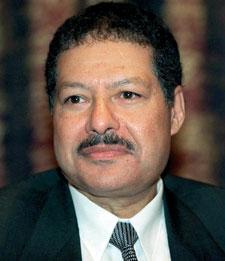Using AI to control energy for indoor agriculture
30 September 2024
Published online 7 February 2011

Prominent Egyptian Nobel laureate Ahmed Zewail, who arrived in Cairo two days ago, sees the present crisis engulfing his home country as an opportunity for President Mubarak to make history, but stopped short of demanding his immediate resignation in a press conference on Sunday.
"President Mubarak has a chance to become the first leader of the largest country in the Middle East to hand power while alive to another leader, thus making history," Zewail told reporters.
He told reporters that, since his arrival in Egypt, he has held meetings with newly appointed Vice-President Omar Suleiman, the Muslim Brotherhood as well as young people from different political parties.
Zewail, winner of the Nobel Prize for Chemistry in 1999, is highly regarded by most Egyptians. This has positioned him to form a 'council of the wise'—along with other prominent businessmen, politicians and intellectuals—to lead discussions between the pro-democracy protesters and the government.
He told reporters that the discussions produced a set of initiatives to break the deadlock including abolishing the 31-year old emergency law in place since the assassination of Anwar El Sadat, the previous president of Egypt. Zewail also called for constitutional reforms, freeing the press and the release of political prisoners held for opposing the regime.
However, the protesters are still holding on to their principle demand to start negotiations—Mubarak's resignation as president. "Any discussions that take place with the government that do not include Mubarak stepping down do not represent me nor do I care about who is conducting them," one of the protesters, who preferred not to be named, told Nature Middle East.
Zewail's popularity on the street may not be enough to convince the protesters to negotiate with Mubarak still in office. Even though the protesters speak of him fondly, several of those protesting in Tahrir Square question whether Zewail should be getting involved as he lives in the United States and is unfamiliar with issues in Egypt.
Nidhal Guessoum, an astrophysicist at the American University of Sharjah, United Arab Emirates, thinks that scientists should participate in such political discussions only if they have something important to contribute. He cautions that people will however, also judge "if they find that those scientists are really benefiting the cause, not just taking advantage of their prominence."
doi:10.1038/nmiddleeast.2011.12
Stay connected: